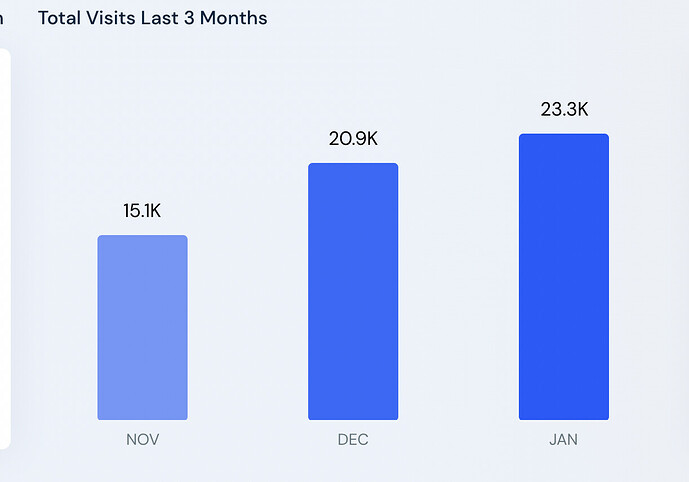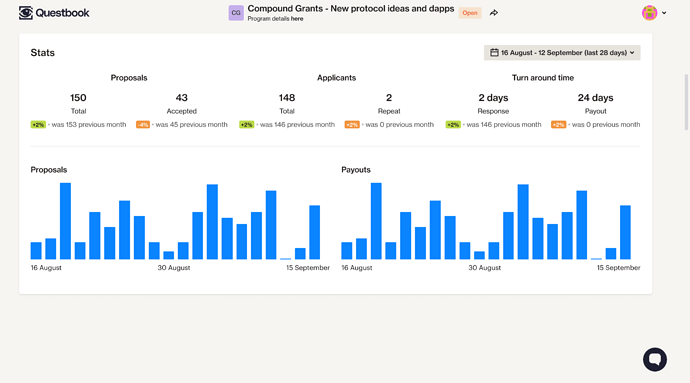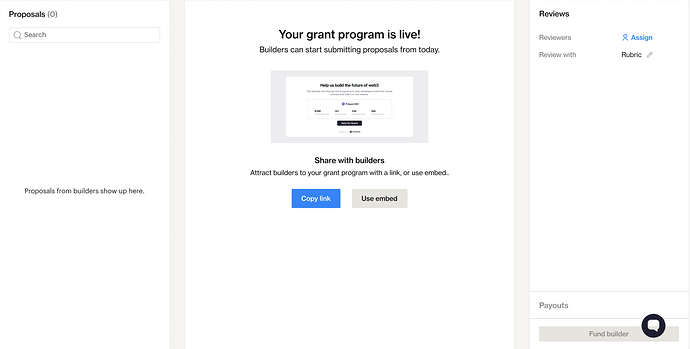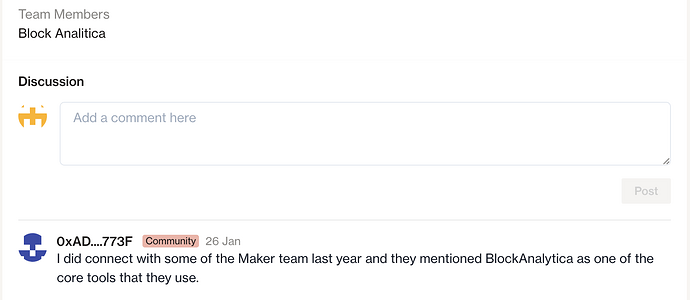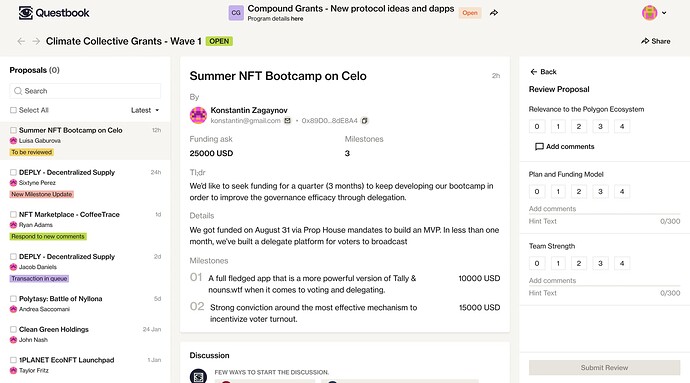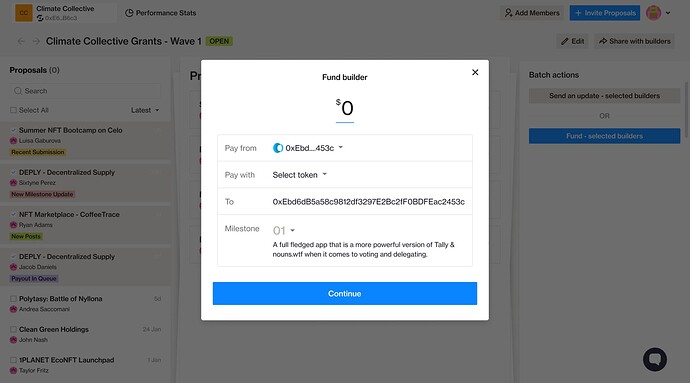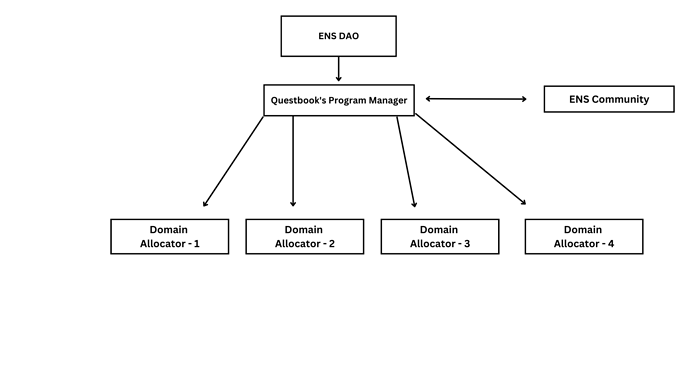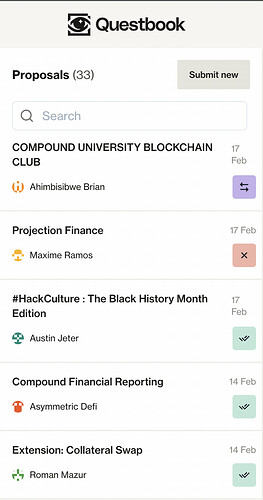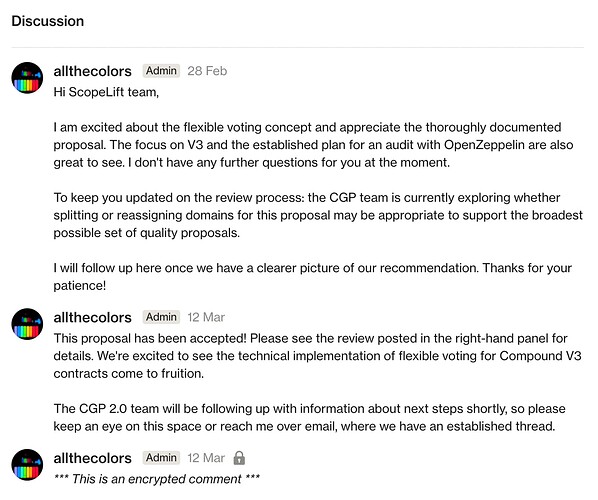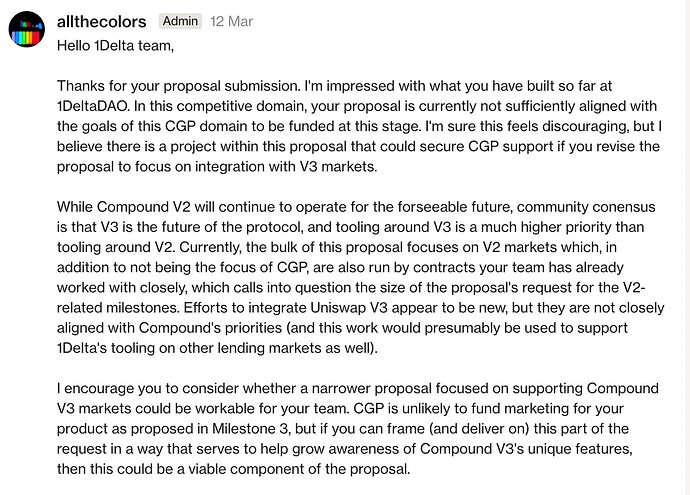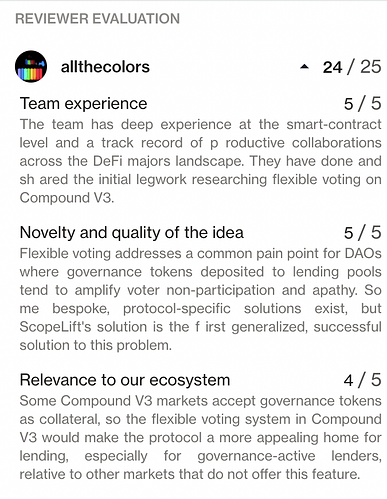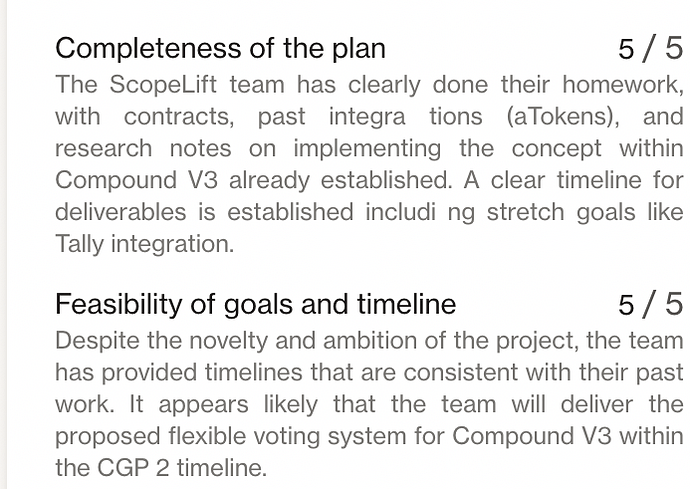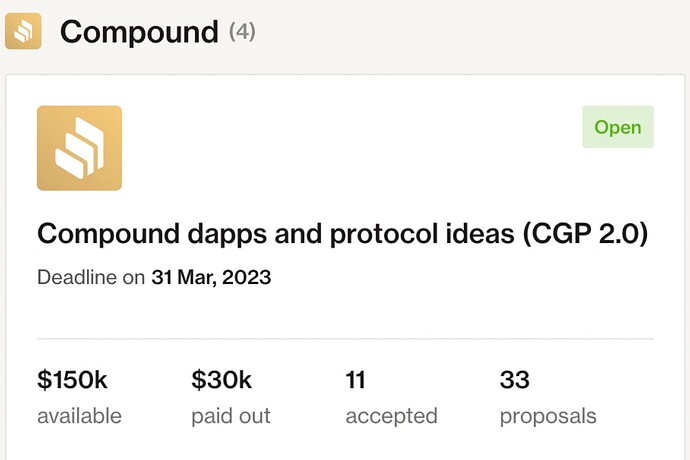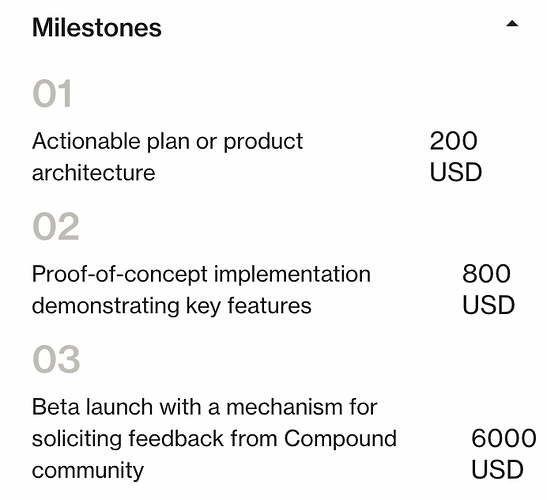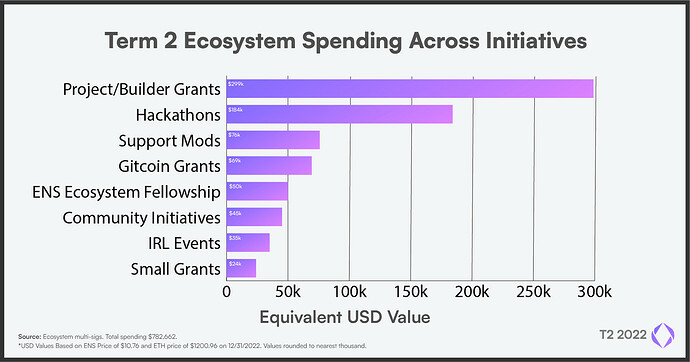Firstly thank you: @she256 for reviewing the proposal. With your valuable input and feedback, it was shaped this way.
Summary
- We propose launching the ENS community grants program of $393K USDC spread across two quarters to fund a wide variety of teams building apps on top of ENS transparently. Questbook is helping Compound run and manage its grants program through delegated domain capital allocation model.
- We propose that this budget be managed by four individuals called Domain Allocators. These domain allocators would manage grants for a domain. These domains are strategic areas of focus for which the foundation wants to disburse grants.
- The performance of each of these domain allocators will be publicly viewable and auditable using rich dashboards. At the end of every quarter, the ENS community can vote to replace, continue domain allocators or increase budgets for each domain allocator.
- We (Questbook.xyz) will help facilitate setting up these domain allocators and provide the tooling to run the grants program efficiently and transparently. We have previously set up or currently setting up the grants process for Compound, Polygon, Solana, Celo, and Aave.
Purpose
An active grant program is a great way to attract and incentivize builders to build on ENS. This proposal aims to benefit all the stakeholders - the builders, the token holders, and the people running the grants DAO.
Running a grant program with a token-based voting system runs into the following problems that this proposal aims to solve:
- Limited Perspective: Community voting is based on the opinions of the majority and may not reflect the diverse perspectives and needs of the entire community.
- Lack of Expertise: Community members may need more knowledge or expertise to decide which projects should receive grants.
- Low Participation: Voting can be time-consuming and requires a high level of engagement from community members. Low participation rates may result in a skewed representation of the community’s needs and preferences.
- Inadequate Data: The voting process may need to collect more data or information about the proposed projects, making it difficult for the community to make informed decisions.
By having domain allocators, we will be able to delegate the outreach and disbursements to members of the community who are the closest to builders. Giving them access to capital and authority to disburse will go a long way in improving the efficiency of the grant program for ENS.
Specifically, this program aims to
-
Increase in quality proposals - Measured by the number of proposals received per month and % of proposals accepted by the domain allocators. Questbook (https://www.questbook.app) is a desired destination for 20,000+ builders each month. We also have a dedicated team responsible for builder engagement and reviewing draft proposals before they are submitted to ensure high quality.
-
More targeted funding: Delegate domain allocators allow the team to focus funding on specific areas or domains. This allows the team to prioritize the most important and impactful areas rather than spreading funding thinly across many projects.
-
Better alignment with goals: The Delegate domain allocators method allows the ENS team to align its grants program with its specific goals and objectives. This will help ensure that the team is working towards the outcomes it wants to achieve rather than simply following a general approach.
-
Strengthen the builder community in the bear market - A crucial component of the community is to keep the builder activity alive even during the bear market. The building keeps innovation and optimism in an otherwise grim market condition. It also drives participation and transparency for the broader community.
In conclusion, funding their grants program using the Delegated domain allocator offers ENS the benefits of decentralization, increased efficiency, lower costs, increased accessibility, and increased transparency.
Program Design
The program structure focuses on having community members as domain allocators. ENS will be required to set a budget of $393K for disbursed by four domain allocators. Each domain allocator will be an expert in their domain and run their domain on-chain for full transparency. The data and performance across key metrics will be visible to the community to evaluate the domain allocator’s performance.
The disbursement of the grant will take place on-chain from a multi-sig wallet controlled by the program manager & the domain allocator. The domain allocator will approve or reject proposals based on their evaluation. The program manager will then coordinate with the ENS community to ensure that the proposal is aligned with ENS ecosystem growth before signing the disbursal. The multi-sig’s sole purpose is to ensure capital is not being siphoned. However, the allocators are encouraged to make independent decisions regarding the approval of the proposal based on their expertise.
Every quarter, the grants committee and the ENS community shall evaluate the performance of each domain using publicly available data. The outcomes could be as follows:
- Change the domain
- Change the allocator/program manager
- Change the budget
Active community members can also initiate a no-confidence motion to initiate a review off-cycle. This can be initiated by one of the active delegates on Snapshot. The program manager can coordinate this, if the situation arises, along with the active community members. The unused funds from every domain will be returned to the treasury at the end of 2 quarters.
Product Screens
Invite proposals to your grants program.
Anyone from the community can view and comment on the proposals
Invite community members to review proposals based on an evaluation rubric
Make milestone-based payouts directly from the multi-sig
Track the performance of the grants program
ENS Grants Committee
The program will consist of
- A Program Manager
- 4 Domain Allocators
A Grants Safe, with 3/5 multi-sig, will be set up between the program manager and four domain allocators. In addition, we will have 4 Safes for each domain with a 2/2 between the program manager and the specific domain allocator.
The funds for the grants program will flow from the ENS treasury into the Grants SAFE. This SAFE will hold the funds related to operational costs, committee compensation, and the grant budget. Funds disbursed to the proposers will reside in the domain-level SAFEs. In addition, the program manager will update the community about approved proposals and their details through bi-weekly community calls and reports over discord.
We have identified the following domains relevant to ENS.
We are open to adding more domains and incorporating changes based on the community’s feedback.
| Domain | Credentials Needed | Individual/Orgs | Why is it relevant |
|---|---|---|---|
| Multichain & Cross Chain Strategy | Experience with managing multichain strategies for popular Web3 applications | TBD | This will help ENS roll out to multiple chains and increase its market share. |
| Integrating ENS as a login solution | Familiarity with building authentication solutions | TBD | This will help ENS onboard new dApps to its ecosystem. |
| Education & research | Proven expertise in developing educational materials, managing large communities, and organizing events for new user onboarding and hackathons. | TBD | These tutorials and guides will help new users understand the benefits of using ENS and the Ethereum network. |
| Integrating ENS with developer libraries and tools | Familiarity with building SDKs and lower-level libraries | TBD | This will help build critical tools, libraries, and dApps and streamline the development process within the ENS ecosystem. |
| Integrating ENS in consumer-facing application | Experience in building Web3 dApps. | TBD | Integrating ENS into consumer-facing applications can help make the ENS ecosystem more accessible and user-friendly, which can help increase its adoption. |
Domain Allocator Roles & Responsibilities:
The following will be the roles and responsibilities of the selected domain allocators.
- Time commitment per week: Estimated 8 hours per week for the program manager and 8 hours per week for the domain allocator, which might vary based on the number of applications. The program manager will ensure that the workload is evenly distributed.
- Program Manager:
- Communication:
- Coordinate between the ENS team and the community regarding funding requirements.
- Communicate the information regarding the approval/rejection of proposals to the ENS community regularly.
- Attend community calls, actively participate in the community forum, keep the community updated, and take their feedback on the program.
- Regularly update the progress of the grants program to the ENS community over Discord and community calls.
- Grants Program Oversight:
- Source good-quality proposals from developer communities.
- Sign the transactions for the approved projects.
- Ensure a quick turnaround time for proposers regarding their proposal decision.
- Coordinate between the domain allocators to ensure that the workload is evenly distributed and take their feedback consistently.
- Communication:
- Domain Allocator:
- Review proposals received for their domains based on the rubrics set by the domain allocator.
- Reject/Approve proposals and coordinate consistently with the program manager.
- Source applications by reaching out to developer communities in their network
- During scheduled meetings, discuss program improvements with the other domain allocators and the program manager.
Compensation:
The grant budget will be $300K, with $75k for each domain. The committee compensation will be $78,800 for domain allocators and one program manager for six months. Note that this is the proposed budget. All unused funds from every domain and committee compensation will be returned to the treasury.
| Role | Hourly Cost (USD) | Number of hours per week (Total number of hours: 24 | Total |
|---|---|---|---|
| Program Manager | 80 | 8 | 15360 |
| Domain Allocator | 75 | 8 | 57600 |
| Miscellaneous (Including operations cost) | NA | NA | 5000 |
| Total Amount Required | 78000 |
P.S
-
- We are inviting applications for the domain allocator role for all the above mentioned domains. All interested community members and delegates can apply in the comments section of this post.
- All payout amounts will be done in USDC
Conclusion
What does success look like?
-
Objective
- The prime objective of this model is to have domains that align with ENS’s priorities. This way, the contribution of the projects as part of the grants program directly adds value to the community and the token holders.
- Increase in the number of proposals projects and projects live on top of ENS.
- Increase in the homegrown leadership to run grant programs (measured by the number of people running grant programs).
- Increase in the community members’ participation to keep grant programs accountable (measured by the number of people looking at the dashboard and participating in the program)
- Diversity in projects being funded across technologies, geographies, and demographics, to name a few. We encourage the community to regularly review the project domains during the ENS community call.
- Increased engagement in builder community’s
- Discourse
- Discord, Telegram
- Social media (Twitter, Reddit)
- GitHub, Radicle
- DAO Tools - Safe, etc.
-
Subjective
- Improved community involvement in the grants program
- Strengthened builders’ sentiment towards ENS.
- Enhanced ENS brand recognition in builder circles.
About Questbook:
Questbook’s role in ENS Grant Program
- Saurabh from Questbook will be the program manager. After that, the program manager will be elected from the community. Saurabh previously worked very closely with the Program Manager of Polygon, facilitating the disbursement of approximately $1 million in grants. Saurabh has received a grant from IoTeX to establish their grant program, and he works closely with the Program Manager of Compound Grants Program 2.0. Saurabh has spoken to more than 100 builders and teams over the last 6-8 months and understands what it takes to make a grant program successful - from both program manager and builder perspectives.
- Questbook Grants tool will make sure the workflows are systematic and transparent.
Product Flows
- Posting a grant - Link
- Reviewing and Funding Proposals - Link
- Settings - Link
- Communicating with Builders - Link
- Funding Builders - Link
Credentials
- Questbook (YC-W21) is a decentralized grant orchestration tool that Compound, Polygon, AAVE, Celo & Solana currently uses.
- Saurabh from Questbook will be the program manager. After that, the program manager will be elected from the community. **** Saurabh previously worked very closely with the Program Manager of Polygon, facilitating the disbursement of approximately $1 million in grants. Saurabh has received a grant from IoTeX to establish their grant program, and he works closely with the Program Manager of Compound Grants Program 2.0. Saurabh has spoken to more than 100 builders and teams over the last 6-8 months and understands what it takes to make a grant program successful - from both program manager and builder perspectives.
Product Compensation
- Questbook: 5% fee for each disbursal
- For any specific asks from the grants team, we charge for the additional features based on the development overhead to run the process more smoothly. From our previous work experience: We propose a budget of $50K be kept aside for specific features.
Community buy-in and next steps
This is a temp check to gather interest to execute such a grant program during the bear market. We will also involve more community members to identify the right domain allocators and the top 4 domains that are most relevant to ENS.
